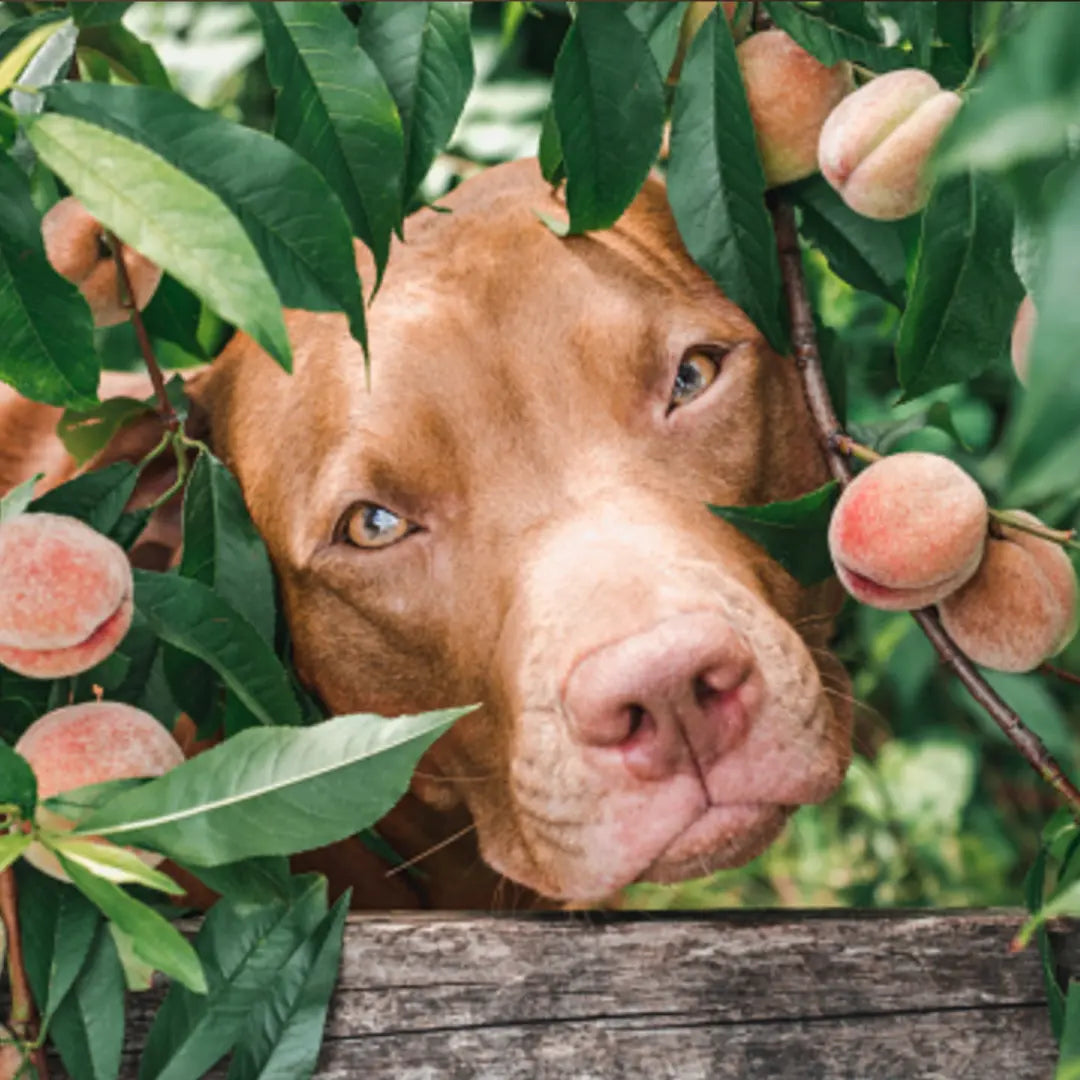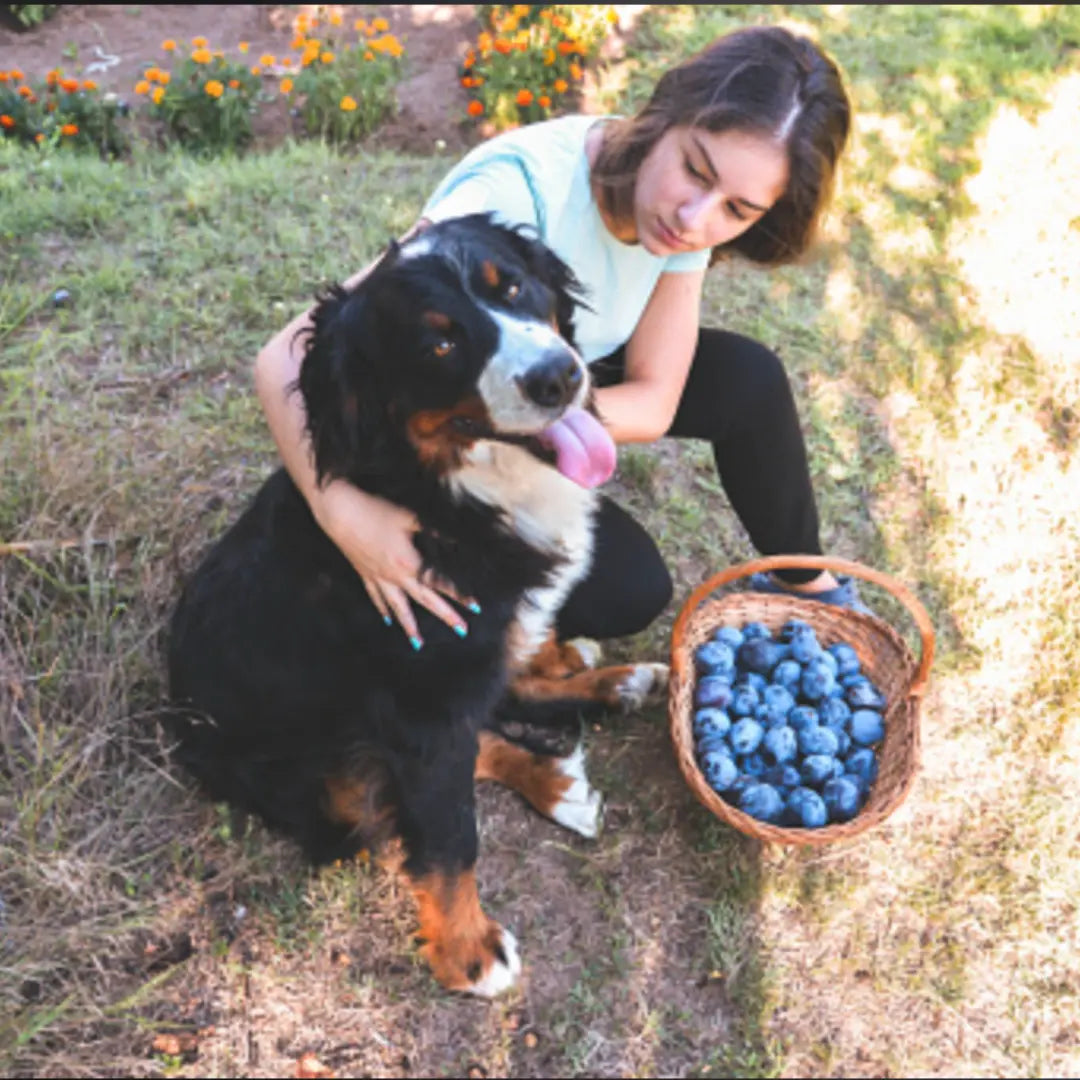Can Dogs Eat Peaches? Everything You Need to Know About Serving Peaches to Your Dog
Peaches For Dogs Highlights
- Low Allergen Food - peaches are considered to very low for allergies
- Avoid the Peach Pit - risk of choking and toxic compounds in the pit
- Feed in Moderation - due to high sugar & fiber content
- Peach Skin - is perfectly healthy to feed
- Never Feed Canned Peaches - can contain sugar and even xylitol which can be poisonous to dog
- Fresh & Frozen - peaches are the best
Peaches For Dogs
Peaches are in season. You want to incorporate more fresh fruit and vegetables into your dog’s diet but wondering what fruits and veg are safe and healthy and which ones to avoid. As your fresh basket of peaches arrives, you might be wondering can dogs eat peaches? The answer is yes, but there are some things to consider. In this blog post, we'll provide you with all the relevant information you need to know before giving your dog this sweet treat plus some recipes & tips on serving peaches to your pup.
Can My Dog Eat Peaches? Can Dogs Have Peaches? Nutritional Health Benefits of Peaches
Peaches contain a wide range of vitamins and minerals. They're an excellent source of vitamin A, which supports healthy vision, skin, and immune function. They're also a great source of vitamin C, which supports a strong immune system, healthy skin, and joint function. Peaches are also rich in potassium, which is essential for heart and muscle health. Potassium deficiency can lead to muscle weakness or even heart disease in dogs.
Rich in Vitamins and Minerals
Peaches are a great source of vitamins A and C, which are essential for maintaining healthy skin and vision. They also contain minerals such as potassium and magnesium, which aid in muscle and nerve function. In addition, peaches are low in calories and fat, making them a healthy snack for your pup.
Boosts Immune System
The antioxidants found in peaches can help boost your dog's immune system and protect against diseases. These antioxidants are also responsible for maintaining a healthy gut, as they help eliminate harmful toxins and promote the growth of beneficial bacteria.
Promotes Digestive Health
The fiber found in peaches can help promote digestive health in your pup. Fiber aids in digestion and helps regulate bowel movements, which can help prevent constipation and diarrhea. It's important to note that too much fiber can cause gastrointestinal distress, so it's best to introduce peaches slowly into your dog's diet.
Low in Allergens
Peaches are considered a low-allergen food, which means they are less likely to cause allergic reactions in dogs. This makes them a great alternative to other fruits that may trigger allergic responses in certain dogs.
Provides Hydration
In addition to being a low-calorie snack, peaches are also a great source of hydration. They are made up of more than 80% water, making them a refreshing treat for your pup on a hot summer day. Just be sure to remove the pit, as it can be a choking hazard.
Possible Risks of Feeding Peaches to Your Dog
While peaches are generally safe for dogs to eat, there are some potential risks involved. One of the most significant risks is the pit. Peach pits contain a compound called amygdalin that dogs can't digest properly. If your dog eats a peach pit, they could suffer from an obstruction in their digestive system, which would require immediate medical attention. Additionally, the pit could also cause choking, dental issues, or even a broken tooth. Always remove the pit before feeding a peach to your dog.
Digestive Issues
Peaches can be rich in sugar and fiber, which can make them hard on your dog’s digestive system. Consumption of a large amount of peaches can lead to upset stomach, diarrhea, vomiting, and other digestive problems that can make your dog feel uncomfortable. Additionally, the pit of a peach can present a choking hazard if swallowed whole, as well as cause intestinal blockage that may require surgery to remove.
Cyanide Poisoning
The seeds, leaves, and stems of peaches, apricots, and cherries all contain small amounts of cyanide. While the amount is usually too small to cause any harm, the cyanide can become dangerous if consumed in large quantities. If your dog eats too many peach pits, he may develop cyanide poisoning, which can lead to seizures, difficulty breathing, and even death. Therefore, it is essential to remove the pit and any other potentially harmful parts of the peach before allowing your dog to eat them.
Allergic Reactions
Some dogs may have an allergic reaction to peaches or develop an intolerance to the fruit over time. Symptoms of an allergic reaction may include itching, hives, swelling, and difficulty breathing. If you notice any of these symptoms after feeding your dog peaches, stop immediately and consult your veterinarian.
Health Risks
In addition to the risks mentioned above, feeding peaches to your dog can also contribute to other health issues. For example, peaches have a high sugar content, which can lead to obesity or diabetes in dogs if consumed in large amounts. They are also acidic, which can damage the enamel on your dog's teeth over time. If you still wish to feed your dog peaches, do so in moderation and make sure to clean their teeth or rinse with water afterward to prevent any damage.
How to Feed Peaches to Your Dog - Are Peaches Good for Dogs?
When feeding your dog peaches, it's essential to prepare them carefully.
Are Peaches ok for Dogs? Yup, as long as you choose ripe peaches.
When picking peaches, make sure they are ripe and organic if possible. Ripe peaches are softer and sweeter, making them easier to eat and digest. Organic peaches mean they are free from pesticides which can be harmful to your pup's health. Frozen peaches without sugar or additives are another easy way to serve up this sweet treat.
Wash and Cut into Small Pieces
Before feeding your dog a peach, make sure to wash and clean it thoroughly. Peaches are covered in fuzz, and your pup may not like that texture but the skin is safe for them to eat. Cut the peach into small pieces, making it easier to eat and digest. Serving peach slices is the best way to feed peaches to your dog.
Are Peaches Safe for Dogs? Yes, just remove the pit.
Peach pits can be hazardous for your dog to eat. It can cause choking, tooth damage, or even blockage in their intestines. Not to mention that there are trace amounts of amygdalin and cyanide compounds found in the pit as well. Make sure to remove the pit before giving the peach to your dog. You can use a spoon to scoop it out or cut around the pit.
Start with Small Amounts
Peaches are high in sugar, which can upset your dog's stomach if eaten in large amounts. As with any new food, start by giving them a small piece to see if they like it and if it agrees with their stomach. If they do, you can increase the amount gradually.
No Canned Peaches
Canned peaches contain high levels of sugar, preservatives, and artificial sweeteners, and some contain xylitol, which can harm your dog's health. Always choose fresh peaches or frozen peaches when feeding them to your dog.
Peaches are a great tasty treat for your pup on a hot summer day. Here are some homemade dog treats with peaches:
Alternatives to Feeding Your Dog Peaches
If the idea of feeding your dog peaches seems too risky or you want to mix up their diet, there are alternatives. You could try feeding them other fruits such as apples, bananas, blueberries, or watermelon. Just be sure to introduce these foods slowly and in moderation, as sudden dietary changes could cause digestive upset.
Peach Recipe for Dogs
Peaches & Cream Pupsicles for Dogs
A simple tasty treat for your dog is to take 1 cup of goat yogurt and blend with 2 fresh peaches or frozen. Freeze in popsicle moulds or ice cube trays. Feed in moderation this delicious summertime treat.
Sunshine Lick Mat for Dogs
Use our Sunshine Lick Mat recipe and just substitute the mango for peaches and your pup will love it! Or if they’re a mango lover, add in peaches with some mango to make it extra fruity.
Cooking for Your Dog
Fresh food is the cornerstone of health and wellness. Moving away from processed foods & treats is not only the healthier option it can also be the best option long term for your dog when you factor in expensive vet visits due to health complications. Join our community of home cooking dog parents. Even a little fresh food can go a long way!
Cook your dog fresh delicious meals in 15 minutes a week, with the confidence that they are getting the optimal nutrients. In just 3 easy steps, mix in cooked protein (beef, lamb, turkey, chicken, pork or cod & egg), Dog Child Meal Mix, water and oil. Bon appetit!







